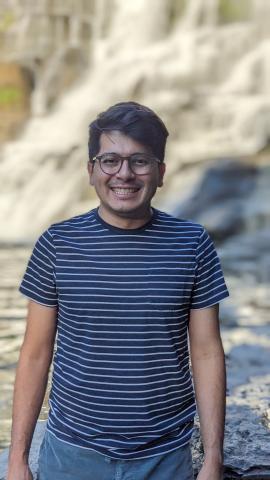Juan Carlos Martínez Mori brings interdisciplinary research as a postdoctoral scholar at Georgia Tech
In 2023, Juan Carlos Martínez Mori was a Ph.D. student at Cornell University when he was named a Schmidt Science Fellow.
The Schmidt Science Fellowship seeks “the brightest minds in the natural sciences, mathematics, engineering and computing.” Applicants must not only demonstrate high research achievement, but also make the case for their ability to successfully pivot into a field outside of their Ph.D. discipline. Upon graduation, Fellows undertake a postdoctoral placement in a world-class environment that best meets their needs to develop interdisciplinary research and skills. Fellows receive $100,000 stipend per year to conduct research in a field outside of their Ph.D. area.
Fortunately for Georgia Tech, Martínez Mori chose the H. Milton Stewart School of Industrial and Systems Engineering.
“My school is a long-established leader in the field,” said Martínez. “On top of that, I found a postdoctoral mentor who I could relate to and who could support me in a broad sense of the word–certainly with the technical aspects of my research, but just as importantly, with navigating this transitional stage of my career.”
Making Pivots: From Civil Engineering to Mathematics and Beyond
For as long as Martínez Mori could remember, he was interested in cities and transportation. After studying civil engineering as an undergrad, his graduate education veered toward mathematics.
“To me, it is super exciting when problems are both mathematically challenging and practically meaningful,” said Martínez Mori. “I tend to find my math problems from problems in the real world.”
By earning his Ph.D. in applied mathematics, he felt that this combined the best of both civil engineering and mathematics worlds.
Innovation Through Interdisciplinary Study
As part of the requirement for fellows to pivot their research, Martínez Mori is now researching cooperative game theory and algorithmic fairness with Alejandro Toriello, professor of industrial and systems engineering.
“To me, it is very rewarding to think about new problems, or to think about old problems through a different lens,” said Martínez Mori. “You start developing a unique perspective on things, and I think that’s how innovation happens. The Schmidt Science Fellows program is specifically designed to support us through this process.”
Research Focus: Fair Decision-Making in Public Goods Design
Martínez Mori’s research at Georgia Tech looks at using computational models to make decisions about the design of public goods, such as public infrastructure. If his research is successful, it could support more effective public decision making.
“I am very excited about our results thus far,” said Martínez Mori. “One thing I learned since I got here is to think about this as a long-term research program, rather than just as one or two papers. This is helping us think carefully about what the right questions are to ask.”
Aside from key findings in his research, Martínez Mori has learned some valuable lessons since becoming a Schmidt Science Fellow.
“I think I have become more comfortable with not knowing,” said Martínez Mori. “Instead, I am more confident in my ability to pick what I want or need to learn for my own research goals.”
Mentorship and Academia: Guiding the Next Generation
Throughout his Ph.D., Martínez Mori mentored many undergraduate students, and he found mentoring-through-research to be rewarding. This experience solidified his interest in an academic career.
“I want to become a faculty member at an institution where I can not only do good research, but where I can mentor students who, for various life circumstances, wouldn’t normally get the chance to go for a Ph.D.,” said Martínez Mori.
He believes that education enables social progress, and it is his long-term goal to give back to his home country of Ecuador through research and education initiatives.
Martínez Mori is supported by the President’s Postdoctoral Fellowship program. This program is run in alliance with the University Partnerships for Faculty Diversity led by the University of California’s Office of the President (UCOP). The current program offers postdoctoral research fellowships, professional development and faculty mentoring to outstanding scholars in all fields whose research, teaching, and service will contribute to diversity and equal opportunity at UC.
